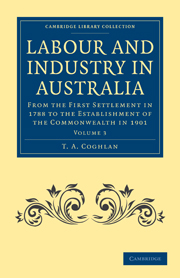 Labour and Industry in Australia
Labour and Industry in Australia Book contents
III - THE EXCLUSION OF THE CHINESE
Published online by Cambridge University Press: 07 October 2011
Summary
From the discovery of gold until about 1870 the chief objection to the Chinese came from the miners; after that year, although the Chinese still frequented the mining fields, the most strenuous opposition to their presence in Australia came from the workers in the capital cities. Nevertheless the Chinese in no sense competed with the city workers. The industry which afforded them most employment was market-gardening, of which they had almost a monopoly, 75 per cent of the whole of the vegetables of the country being grown by Chinese. The industry was not one to which the European colonist took readily, and until the coming of the Chinese the country was very ill supplied with this most necessary article of food, and if it had not been for them the country parts of Australia would have been almost, if not entirely, destitute of any local supply. With their practical monopoly of market-gardening they were naturally the principal hawkers of vegetables, as the growers usually sold to the consumer without the intervention of a middleman. The allied trade of greengrocery was in the possession of the Europeans and Chinese in about equal proportions, while of the fruit trade the Chinese held about one-fifth. Tobacco-growing the Chinese had entirely in their own hands, not two growers in a hundred being Europeans. Large numbers of Chinese still clung to the search for metals, but their employment in nowise interfered with the whites as they confined themselves to working alluvial tin deposits or searching the rivers and streams and the abandoned diggings for gold.
- Type
- Chapter
- Information
- Labour and Industry in AustraliaFrom the First Settlement in 1788 to the Establishment of the Commonwealth in 1901, pp. 1331 - 1345Publisher: Cambridge University PressPrint publication year: 2011First published in: 1918
